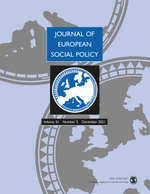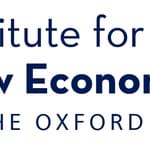Top Income Adjustments and Inequality: An Investigation of the EU-SILC†
The Oxford Martin Programme on
Inequality & Prosperity
This programme on promoting inclusive growth was established in 2016 as part of the Oxford Martin School’s research partnership with Citi, supported by Citi up to 2021 as a core element of the on-going collaboration between the Institute for New Economic Thinking at the Oxford Martin School and the University’s Department of Social Policy and Intervention. The following page is an archived resource.
The Challenge
When the benefits of economic growth are increasingly concentrated at the top of the distribution, as has been the case in many rich countries over recent decades, this poses a major threat to long-term growth and prosperity. There is an urgent need to understand what has been driving this concentration and identify a coherent set of responses to address it in a way that promotes inclusive growth.
The programme’s research team led by Professor Brian Nolan and including Tim Goedemé, Helen Kowalewska, Matteo Richiardi, Luis Valenzuela Rivera and David Weisstanner investigated a set of inter-related questions about the drivers of economic inequality, how inequality affects economic growth and living standards as well as intergenerational mobility and opportunity, the relationship between inequality in income and in wealth, how inequality affects individuals’ social status and political preferences and behaviour, and how best to frame policy responses including via the tax and transfer systems, family policy, and wealth endowments.
The programme of research on inequality-related topics in INET and the Department of Social Policy and Intervention is continuing supported from 2021 onwards by a 6-year grant from the European Research Council to Professor Nolan in collaboration with Thomas Piketty (Paris School of Economics) and Emmanuel Saez (University of California-Berkeley) for Towards a System of Distributional National Accounts.
research themes
Rewarding Work
This research stream focused on the complex relationships between the division of national income between labour and capital, personal income inequality, and living standards. It highlighted the role of labour market and product market power, having exploiting the potential of firm-level data and new analytical approaches to probe these topics. It assessed the contribution of the various factors driving increasing inequality, bringing out the importance of institutions and policies going beyond forces such as technological change to include regulation, collective bargaining, minimum wages and tax/benefit systems.
Inequality, Wealth and Opportunity
This stream of research probed the relationship between increasing income inequality, the concentration of wealth towards the top, and opportunity. It assessed ways in which wealth and the income arising from it can be spread more widely and what avenues are open to the state to achieve this, including via potential universal wealth endowment schemes. It investigated core channels in the transmission of economic advantage and disadvantage across generations, in particular the direct and indirect benefits of coming from a wealthy family and how this affects wealth inequality and inequality of opportunity.
Inequality, Taxation and Social Transfers
The role of the state in redistribution via taxes and transfers is critical to growth and prosperity. The research has unpacked how market income inequality relates to inequality in incomes after taxes and transfers, and how rising inequality has affected those in the middle and lower parts of the distribution in particular. This underpinned conclusions on strengthening the effectiveness of social transfers for working-age households and align them with labour market institutions (such as minimum wages) to form a coherent strategy to encourage labour market participation and investment in human capital while supporting living standards. The role of family policies in supporting female labour force participation was also a key focus.
Inequality and Societal Wellbeing
Income inequality is widely seen as having important consequences for societal wellbeing and the democratic political process, which in turn condition the responses available to promote policies for inclusive growth.
This research stream studies how income inequality affects individuals’ social trust, their political preferences (such as attitudes towards redistribution) and their political behaviour. The much-debated role of declining or threatened social status was a specific focus in considering how democracies are being challenged by various deepening socio-economic cleavages.
Featured publications
Inequality and Prosperity in the Industrialized World: Addressing a Growing Challenge
This Citi GPS report sets out how income inequality has risen in most OECD countries in recent decades. The recession following the global financial crisis has exacerbated this trend in some of the worst-hit countries, while sometimes interrupting it elsewhere.
This report investigates the forces driving inequality upwards, highlighting the role of technological change, globalisation, deregulation, declining union power, demographic change and weakening redistribution by taxes and transfers.
Download the CIti GPS reportGenerating Prosperity for Working Families in Affluent Countries
Rising inequality has become such a widespread concern in rich countries primarily because it is seen to be associated with long-term stagnation in living standards for ordinary working households, compounded by the Great Recession.
This book presents the findings of a comprehensive analysis of performance in improving ordinary living standards over recent decades across the wealthy nations of the OECD. By looking across a broad canvas, the book draws important lessons for how best to pursue the quest for inclusive growth and prosperity.
Buy the book at Oxford University Presspublications


Improving Take-Up by Reaching Out to Potential Beneficiaries. Insights from a Large-Scale Field Experiment in Belgium

The Journal of European Social Policy special issue on social policy and wealth

Ireland’s Household Worklessness and Working-Age Market Income Inequality

Between-class earnings inequality in 30 European countries. A regression-based decomposition

Inheritance, gifts and the accumulation of wealth for low-income households

Wealth inequality, intergenerational transfers, and family background

Improving the understanding of poverty and social exclusion in Europe — 2021 edition

Lockdown, Earnings Losses and Household Asset Buffers in Europe

Rising Income Inequality and Subjective Social Status: The Nuanced Relative Status Decline of the Working Class since the 1980s

To what extent do welfare states compensate for the cost of children? The joint impact of taxes, benefits and public goods and services

The Claiming Costs Scale: A new instrument for measuring the costs potential beneficiaries face when claiming social benefits

Social status inequality and depression in Europe

Regional Variation in Inequality of Educational Opportunity across Europe

Occupational Social Class and Earnings Inequality in Europe: A Comparative Assessment

Cross-Class Embeddedness through Family Ties and Support for Income Redistribution
videos
View all"Measuring poverty around the world" - Tony Atkinson’s new book with Prof Brian Nolan, Prof John Micklewright & Dr Sabina Alkire
"Wealth inequality in political perspective" with Prof Ben Ansell
"Children of austerity: impact of the great recession on child poverty in rich countries" with Prof Brian Nolan
"An age-old problem? Exploring Britain’s new wealth divides" - Panel Discussion
latest news
How wealth matters for social policy
Along with my colleague Professor Ive Marx of the University of Antwerp and Herman Deleeck Centre for Social Policy, I am proud to introduce a new special issue from the Journal of European Social Policy on social policy and wealth that we have edited.
Intergenerational wealth transfers drive inequality in Britain
This direct transmission of wealth across generations impacts directly on the extent of wealth inequality, concludes a report published today by researchers at the University of Oxford’s Department of Social Policy and Intervention and the Institute for New Economic Thinking at the Oxford Martin School, supported by the Nuffield Foundation.
Bank of England chief economist lays out the costs of income insecurity for UK households
Income insecurity and its impact on households is the economic scourge of the early 21st century for the UK, the Bank of England’s chief economist told an audience at the Oxford Martin School today (28 February).
Major European Research Council Synergy funding win for economic inequality project
Professor Brian Nolan, of the Department of Social Policy and Intervention and Institute for New Economic Thinking at the Oxford Martin School, has been announced today as one of the winners of a prestigious European Research Council Synergy grant.
Why we can’t just blame rising inequality for the growth of populism around the world
Seeking prosperity for the ‘squeezed middle’ and below
New report investigates increasing inequality in rich countries and why this needs to be taken seriously
Is child poverty in rich countries exacerbated by the economic crisis?
It’s employment status, not class, that affects mental health
What influences intergenerational social mobility in Europe?
Keep in touch
If you found this page useful, sign up to our monthly digest of the latest news and events
Subscribe